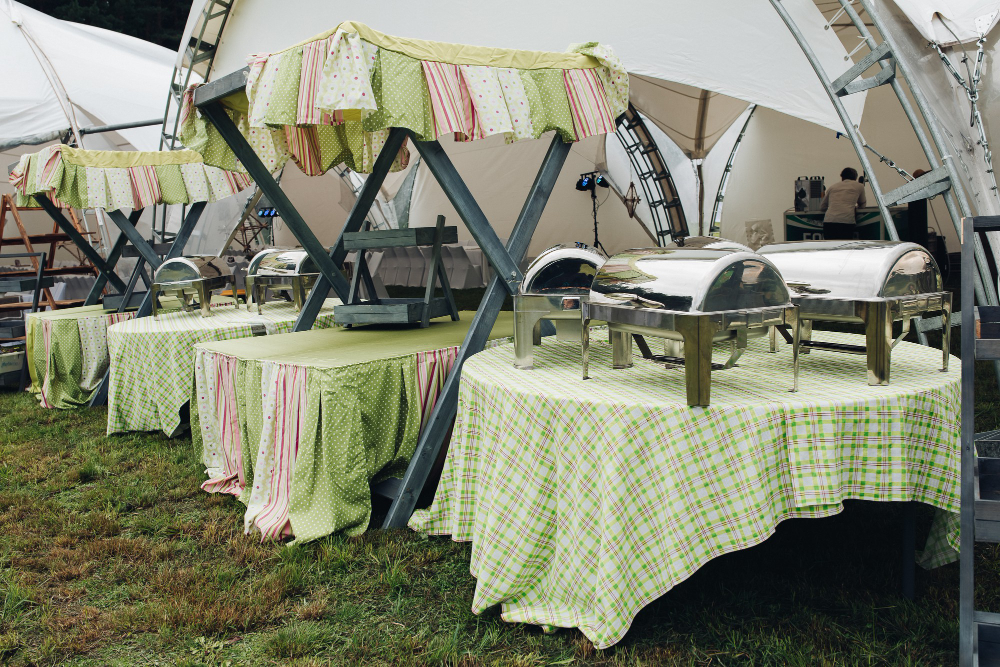
In recent decades, the world of consumption has undergone a significant transformation. Environmental awareness has gone from a marginal approach to a mainstream in contemporary consumer culture. The events sector, previously known as a source of wasteful resources and the creation of enormous waste, is in the midst of a fundamental change. Renting tents and equipment for events actually represents a complete revolution in the perception of consumption, combining environmental, economic and social considerations.
The events industry is considered one of the most wasteful industries in the economy. A single event can produce dozens of tons of waste, from disposable equipment to packaging materials and leftovers. Recent data shows that a medium-sized event can produce up to 20 kilograms of waste per attendee, making rental a critical and essential solution.
Equipment rental represents the principle of the "circular economy" in its full meaning. While the traditional economy operates on the basis of a "take-make-throw" model, the circular economy emphasizes circularity, reuse, and maximizing the life of the product. A tent purchased for a single event can be used once, while a rented tent can serve dozens or even hundreds of events over the years.
The process of manufacturing event equipment requires enormous amounts of energy. For example, manufacturing a single tent can require up to 100 kWh of energy, including raw material processing, transportation, and manufacturing. Rental reduces the demand for repeated production and significantly reduces the energy footprint.
all Equipment rental Reduces the need to manufacture new products, thereby contributing to reducing greenhouse gas emissions. Studies show that equipment rental can reduce up to 60% of the carbon emissions associated with the production of event equipment.
Event equipment rental goes far beyond a purely technical or economic solution. It is a socio-cultural movement that reflects a profound shift in the way society perceives consumption, resources, and environmental responsibility. It is a move that challenges traditional notions of purchase and exchange, and instead offers a more conscious, responsible, and collaborative approach.
The move to equipment rental sends significant social messages. First, it expresses clear environmental responsibility - a conscious choice to reduce waste and maximize the use of resources. Second, it represents a high level of consumer awareness, which favors systemic thinking over selfish and short-term consumption. The model encourages more creative and flexible thinking in relation to resource management.
Above all, equipment rental promotes the idea of community collaboration. Instead of each person purchasing equipment to use for a short time, a model of shared use and resource sharing is created. This is essentially a new socio-economic model, encouraging solidarity and shared responsibility.
However, the transition to this model is not without challenges. The change requires dealing with traditional consumer perceptions that prefer purchasing over renting. Significant work is required to assimilate the rental culture among the public, while developing logistical infrastructure and supporting technologies.
On the other hand, the opportunities are exciting. Developing innovative technologies can make the rental process simpler, more accessible, and more efficient. Entrepreneurs and companies can create innovative business models that combine technology, sustainability, and convenience. In addition, every step in this direction contributes to the global fight against climate change.
Tents are one of the most significant items of equipment in the world of events. While in the past it was customary to purchase tents for single use, today a new model of Tent rental Offering a more environmental and practical solution.
Manufacturing a tent requires significant resources - synthetic fabrics, metals, sealants and paints. A single tent can require up to 100 kilograms of various raw materials, which include complex manufacturing processes that emit greenhouse gases. Rental allows for the extension of the product's life and maximized use, so that one tent can be used for dozens or even hundreds of events during its lifetime.
Tents represent a perfect example of the rental model. They are expensive equipment, complex to store, and require professional maintenance. Rental companies specialize in full service - from transportation, through professional setup, to cleaning and storage. They provide tents in a variety of sizes, shapes, and styles, providing a precise solution for every event.
A tent purchased for a single event often ends up in the trash or stored unused. In contrast, a rented tent undergoes ongoing maintenance, is professionally maintained, and is used again and again. This reduces the amount of waste and avoids wasting valuable resources.
Renting tents allows for maximum flexibility. Event organizers can choose tents in sizes and designs that are precisely tailored to their needs, without the need for a large purchase investment. This allows for innovation in event design and creativity in choosing solutions.
Despite the advantages, there are challenges: changing traditional consumer perceptions, implementing a rental culture, and the need to develop advanced logistics infrastructure. Investment is required in training, marketing, and supporting technologies.
Tent rental represents more than a technical solution - it is an environmental, economic and social move. It challenges the culture of disposable consumption and offers a sustainable, smart and environmentally friendly model.
Equipment rental is not just a method, but a worldview. It symbolizes a shift from short-term consumerist thinking to a systemic, sustainable, and responsible vision. It is in fact a journey of cultural change, challenging existing norms and proposing a more conscious and shared future.
Event equipment rental is not just a passing trend, but a strategic move that is changing the face of the events industry. It is a model that combines environmental innovation, advanced economic thinking, and social responsibility.
In an era of climate crisis and the urgent need for sustainable solutions, equipment rental represents real hope for a greener future. It is a practical way to reduce waste, conserve resources, and create meaningful change – one event at a time.